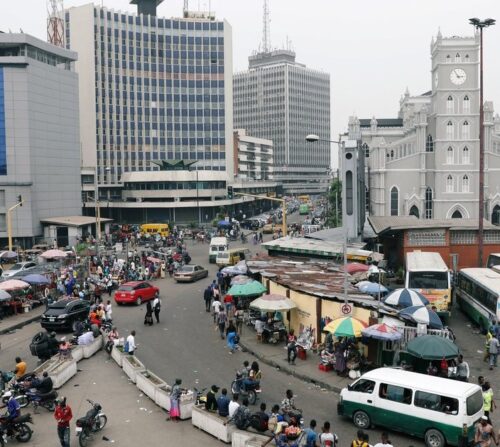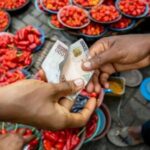
Despite economic turbulence, Nigeria’s economy is showing resilience following a series of tough policy reforms. Analysts and investors remain optimistic about 2025, particularly the first quarter, as the nation continues its path to recovery.
According to Bismarck Rewane, Managing Director of Financial Derivatives Company (FDC), 2025 could mark a turning point for Nigeria, demonstrating its ability to navigate deep-seated economic challenges. Speaking at a session at the Lagos Business School, he noted that while the country faces uncertainties, key indicators suggest a recovery trajectory.
Several economic markers, including exchange rate stabilization, foreign reserve growth, and GDP projections, indicate an improving economic landscape. However, the benefits of these gains have yet to be fully felt by the average Nigerian.
The following are the economic indicators of Nigeria’s recovery;
Strengthening Of The Naira
The naira is projected to maintain an upward trajectory, strengthening to around ₦1,400 per US dollar by the end of 2025’s first quarter. After closing at ₦1,535/$ in 2024, the local currency is expected to hover between ₦1,550 and ₦1,600/$ in the parallel market.
According to CitiBank, the naira has shown strong performance in recent months due to increased investor confidence, foreign inflows into government securities, and rising oil production. Sustained interventions by the Central Bank of Nigeria (CBN) have also contributed to its stability.
Inflation Expected To Decline
Nigeria’s inflation rate, which surged to 34.8% in December 2024, is forecasted to drop to 33.12% in the first quarter of 2025. This decline is attributed to a more stable naira and adjustments to the country’s Consumer Price Index (CPI).
According to the National Bureau of Statistics (NBS), inflation has already decreased to 24.48% in January 2025, inching closer to President Bola Tinubu’s 15% target.
Business Activity On The Rise
The Purchasing Managers’ Index (PMI), a key measure of business confidence, is projected to average 53 in the first quarter, signaling an improvement in business conditions.
According to data from the Stanbic IBTC PMI survey, Nigeria’s PMI climbed to 54.5 in January 2025, marking the fastest expansion in business activity in 21 months. Analysts attribute this to lower inflation and more stable interest rates, which have improved the business environment.
Stock Market Set For Growth
Nigeria’s stock market is expected to grow by 4.29%, driven by a stable interest rate environment and investor optimism.
The Monetary Policy Rate (MPR) is projected to remain at 27.5%, ensuring a favorable climate for investments. Analysts believe that lower inflation and positive GDP growth will support this decision.
Oil Production Expected To Increase
Nigeria’s oil production is set to rise from 1.43 million barrels per day (mbpd) to 1.48 mbpd as efforts to curb oil theft and pipeline vandalism gain momentum.
Additionally, global crude oil prices are projected to increase to $75 per barrel, driven by potential supply disruptions from key US suppliers like Canada and Mexico. With oil revenue accounting for nearly 80% of Nigeria’s earnings, this price boost could further strengthen the economy.
Foreign Reserves On The Rise
Nigeria’s external reserves are expected to reach $42.2 billion by the end of the first quarter of 2025, up from $40.8 billion in 2024. The rise in reserves is attributed to higher oil production and increased foreign exchange inflows.
GDP Growth
Nigeria’s gross domestic product (GDP) is expected to rise from 3.46% in the fourth quarter of 2024, to 3.8% in the last three months of the year. However, experts anticipate a minor slowdown in the first quarter of 2025, with growth dipping to 3.6% due to reduced post-holiday spending and seasonal declines in agriculture.
Surge In Foreign Investment In Nigerian Securities
Nigeria’s treasury bills have witnessed an increase in demand, with the most recent auction attracting ₦3.22 trillion—the highest in nine years.
Global investment banks, including J.P. Morgan and CitiBank, have expressed optimism about Nigeria’s securities. A report by J.P. Morgan titled Emerging Market Frontier Local Markets Compass highlighted Nigeria’s reform-driven attractiveness to investors.
CitiBank analysts noted that international investors are increasingly showing interest in Nigerian government bonds and securities, citing subsidy removals, increased oil revenue, and foreign exchange reforms as key factors stabilizing the economy.
While Nigeria’s economy is showing signs of recovery, experts stress that sustained progress depends on maintaining policy stability, improving infrastructure, and ensuring economic reforms translate into tangible benefits for citizens.
According to Ayo Teriba, CEO of Economic Associates, Nigeria’s economic outlook remains positive, but the government must prioritize long-term strategies that address inflation, exchange rate volatility, and job creation. “The positive impacts of these reforms will take time to materialize,” Teriba stated. “If inflation continues to decline and the exchange rate remains stable, Nigerians will begin to feel the benefits.”
As Nigeria moves further into 2025, maintaining investor confidence, stabilizing the currency, and tackling inflation will be key to ensuring sustainable economic growth.


